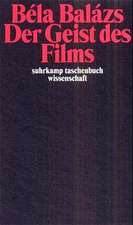Continuity and Crisis in German Cinema, 1928–1936: Screen Cultures: German Film and the Visual
Autor Barbara Hales, Mihaela Petrescu, Valerie Weinstein, Anjeana K. Hans, Bastian Heinsohnen Limba Engleză Hardback – 19 oct 2016
Din seria Screen Cultures: German Film and the Visual
-
 Preț: 403.36 lei
Preț: 403.36 lei -
 Preț: 262.02 lei
Preț: 262.02 lei -
 Preț: 242.53 lei
Preț: 242.53 lei -
 Preț: 240.30 lei
Preț: 240.30 lei - 23%
 Preț: 728.11 lei
Preț: 728.11 lei -
 Preț: 179.28 lei
Preț: 179.28 lei -
 Preț: 134.46 lei
Preț: 134.46 lei -
 Preț: 250.38 lei
Preț: 250.38 lei -
 Preț: 258.47 lei
Preț: 258.47 lei - 23%
 Preț: 889.16 lei
Preț: 889.16 lei - 23%
 Preț: 727.94 lei
Preț: 727.94 lei - 19%
 Preț: 645.51 lei
Preț: 645.51 lei - 19%
 Preț: 561.60 lei
Preț: 561.60 lei - 19%
 Preț: 676.70 lei
Preț: 676.70 lei - 23%
 Preț: 725.42 lei
Preț: 725.42 lei - 23%
 Preț: 726.01 lei
Preț: 726.01 lei - 19%
 Preț: 677.49 lei
Preț: 677.49 lei - 23%
 Preț: 727.37 lei
Preț: 727.37 lei - 19%
 Preț: 701.04 lei
Preț: 701.04 lei - 19%
 Preț: 703.25 lei
Preț: 703.25 lei - 23%
 Preț: 727.23 lei
Preț: 727.23 lei
Preț: 727.23 lei
Preț vechi: 944.45 lei
-23% Nou
Puncte Express: 1091
Preț estimativ în valută:
139.16€ • 146.33$ • 114.98£
139.16€ • 146.33$ • 114.98£
Carte tipărită la comandă
Livrare economică 17 aprilie-01 mai
Preluare comenzi: 021 569.72.76
Specificații
ISBN-13: 9781571139351
ISBN-10: 1571139354
Pagini: 344
Dimensiuni: 158 x 240 x 31 mm
Greutate: 0.66 kg
Editura: CAMDEN HOUSE
Seria Screen Cultures: German Film and the Visual
ISBN-10: 1571139354
Pagini: 344
Dimensiuni: 158 x 240 x 31 mm
Greutate: 0.66 kg
Editura: CAMDEN HOUSE
Seria Screen Cultures: German Film and the Visual
Notă biografică
Barbara Hales, Mihaela Petrescu, Valerie Weinstein
Cuprins
List of Illustrations Acknowledgments Introduction "Timid Heresies": Werner Hochbaum's Razzia in St. Pauli (1932) - Christian Rogowski Film as Pedagogy in Late Weimar and Early Nazi Cinema: The Role of the Street in Mobilizing the Spectator - Bastian Heinsohn "A Fairytale for Grown-ups": Financial and Cinematic Crises in Die Koffer des Herrn O.F. (1931) - Paul Flaig "Denn Gold ist Glück und Fluch dieser Welt": Examining the Trope of "Gold" in Gold (1934) and Der Kaiser von Kalifornien (1936) - Owen Lyons Degenerate Disease and the Doctors of Death: Racial Hygiene Film as Propaganda in Weimar and Early Nazi Germany - Barbara Hales "White Jews" and Dark Continents: Capitalist Critique and Its Racial Undercurrents in Detlef Sierck's April! April! (1935) - Valerie Weinstein The Zigeunerdrama Reloaded: Leni Riefenstahl's Fantasy Gypsies and Sacrificial Others - Anjeana Hans Regaining Mobility: The Aviator in Weimar Mountain Films - Wilfried Wilms Brigitte Helm and Germany's Star System in the 1920s and 1930s - Mihaela Petrescu Foreign Attractions: Czech Stars and Ethnic Masquerade - Kevin B. Johnson Objects in Motion: Hans Richter's Vormittagsspuk (1928) and the Crisis of Avant-Garde Film - Brook Henkel Seeing Crisis in Harry Piel's Ein Unsichtbarer geht durch die Stadt (1933) - Kalani Michell Playing the European Market: Marcel L'Herbier's L'Argent (1928), Ufa, and German-French Film Relations - Margrit Frölich A Serious Man? Ernst Lubitsch's Anti-War Film The Man I Killed (a.k.a. Broken Lullaby, USA 1932) - Richard W. McCormick Selected Bibliography Notes on the Contributors Index





